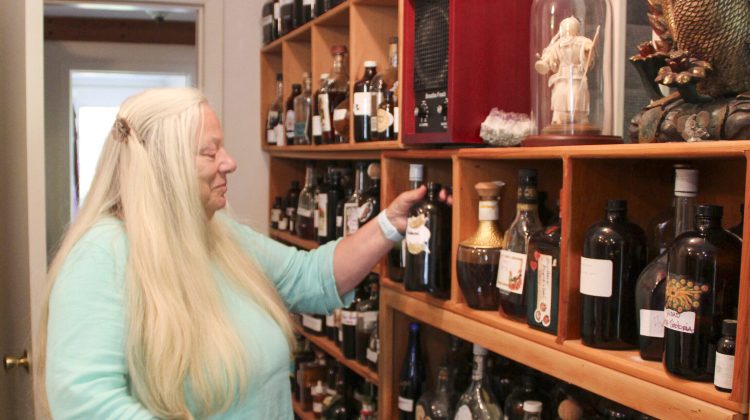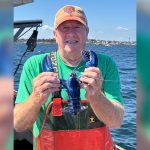MARBLEHEAD — For nearly five decades, Margi Flint has stood as one of the most respected voices in American herbalism.
Her name is synonymous with clinical herbal practice, compassion, and the living continuation of a Western herbal lineage that bridges ancient traditions with modern understanding. Flint’s reputation stems not only from her long clinical career, but also from her tireless work preserving and publishing the teachings of her mentor, William LeSassier, one of the 20th century’s most influential herbalists.
From her home, Flint has practiced, taught, and written about the art of healing through plants.
Her landmark book, “The Practicing Herbalist,” now in its fourth edition, has become a foundational text for practitioners worldwide.
Her book’s diagnostic chapters are what she learned from LeSassier some 40 or so years ago. All of her years of practice are imbued with that knowledge.
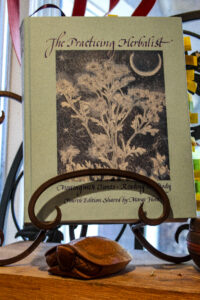
But beyond her own achievements, Flint’s enduring contribution lies in her role as the custodian of LeSassier’s unpublished works — a monumental effort she has pursued for years.
Flint first met LeSassier at a rustic herbal conference decades ago.
“When I met him,” she recalled, “I knew he was my teacher.”
LeSassier’s methods — spiritual, intellectual, and intuitive — transformed her understanding of medicine. Known for developing the Triune or Triangle System, his holistic framework integrated body, mind, and spirit, blending elements of Western herbalism, Traditional Chinese Medicine, Ayurveda, and indigenous healing systems.
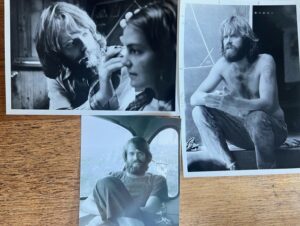
LeSassier’s genius was matched only by his eccentricity. He began practicing at 16, traveling the country as a self-taught healer and immersing himself in Native American, South American, Hawaiian, Chinese, and Indian medical traditions. His work eventually gave rise to a uniquely Western model of herbal medicine, and nearly every major herbalist of his generation — names like Rosemary Gladstar and Matthew Wood — counted him as a mentor or inspiration.
When LeSassier died in 2003, he left behind an enormous archive — two milk crates filled with thousands of pages of handwritten and typewritten notes, diagrams, and unfinished manuscripts. For two decades, those files sat untouched. Then, at the request of LeSassier’s daughter, Flint took up the challenge of bringing his life’s work to light.
For the past three years, Flint has spearheaded the LeSassier Archive Project, a Herculean task involving over 50 volunteers who have painstakingly transcribed, organized, and edited more than 1,000 digitized TIFF files. These manuscripts — crooked scans of decades-old papers — contain LeSassier’s lectures, notes, and drafts on subjects ranging from formulation theory to organ system energetics, herbal diagnostics, and spiritual healing.
A thousand pages have been transcribed and color-coded into four books. Tavish Peckham oversees all things digital.
From this massive collection, Flint is curating four books that will finally share his teachings with the world:
The historic record of the works of William LeSassier will include:
- “The Birth Epoch and Care of the Young” by Richard Mandelbaum at The ArborVitae School of Traditional Herbalism www.arborvitaeny.com/
- “Herbs, Materia Medica” by Matthew Wood. The Oak Leaf School, Matthew Wood Institute of Herbalism. www.matthewwoodinstituteofherbalism.com/
- A System of Herbology Assessments, The Triune System, Formulation, Health Conditions by Margi Flint RH HM.
- “Colors, Gems, Auras, Astral Visions” by Flint’s assistant, Tavish Peckham. Grandmother of Herbs Rosemary Gladstar, Home • Voices of our Herbal Elders • Herbal Harmony: Margi Flint’s Fusion of Plant Wisdom and Creativity ~ Voices of our Herbal Elders Ep. 13. www.scienceandartofherbalism.com/category/voices-of-our-herbal-elders/
The project has become a community effort, with contributions from prominent herbalists like Matthew Wood, Roy Upton, and several herbal schools across the U.S. Flint coordinates the work largely by hand, assisted by volunteers who travel from across the country to help.
“This is a group effort of his students who all shine in his light. When the books are published and bills are paid, his children will receive a percentage of the profits,” Flint said. “As is the right thing to do.”
Her goal is to publish e-books first, followed by printed editions, with profits supporting LeSassier’s surviving children.
Flint’s own journey is as remarkable as her mentor’s. She began as a young artist and dancer, later drawn into healing work after surviving a life-threatening pituitary tumor in her 20s.
“I was told I had a year and a half to live,” she remembered. “So I just decided to live — dance, study, and learn everything I could.”
That defiant vitality continues to infuse her teaching.
For 20 years, she served as a labor coach and herbalist, attending home births, bringing her signature warmth and intuition into the most intimate spaces of human experience. Her work has since extended to teaching at medical schools, nursing programs, and universities across North America and Europe, including Tufts University, Pacific Rim College, and the Massachusetts College of Pharmacy.
Despite health setbacks — including a serious heart episode during the pandemic — Flint remains determined to see the LeSassier books completed.
“These works are historically important,” she said. “Once they’re out, I can breathe again.”
At 75, Margi Flint continues to teach, mentor, and organize fundraisers to sustain the publication project.
“I need help,” she admitted candidly. “Volunteer help. I have no money left in the fund.”
Her goal is to complete the editing and design for all four volumes and to preserve the authenticity of LeSassier’s voice for future generations of herbalists.
The project is a testament not only to LeSassier’s brilliance but also to Flint’s own devotion to service — her belief that herbal medicine is, above all, a lineage of love and learning.
“In this field,” she said, “you honor your teachers. You never claim this is your knowledge. It’s a melting pot of the teachers we study with.”
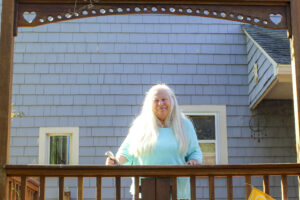
Through her teaching, practice, and preservation of her mentor’s work, Flint has ensured that the roots of Western herbalism remain alive and thriving. Her story reminds us that medicine, like nature, grows best when tended with patience, reverence, and community.
As she often says, “Body, mind, and spirit have no commas” — and neither does the continuous, interconnected legacy she continues to build.

